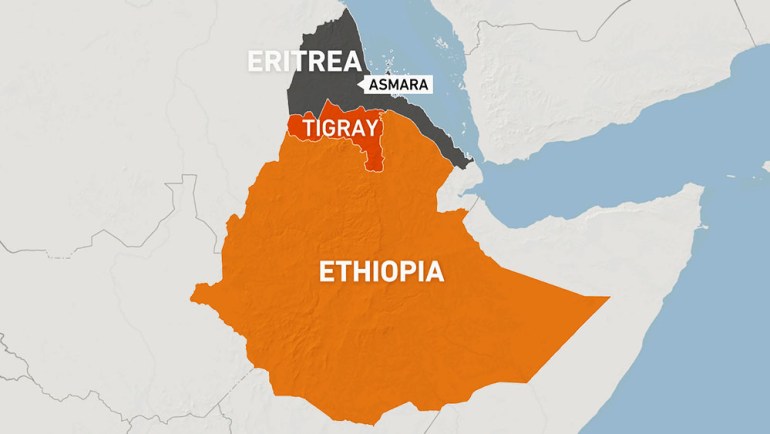Ethiopia: Both sides claim military gains as fighting rages
An estimated 30,000 Tigrayans have fled to Sudan with the UN warning a humanitarian disaster is unfolding.

The leaders of Ethiopia’s rebellious Tigray region refused on Wednesday to surrender to federal troops and instead claimed they were winning a war that has exacerbated ethnic fractures in the vast nation and further destabilised the Horn of Africa.
The Tigray People’s Liberation Front (TPLF) said it was defeating “the enemy” and its citizens “will never kneel” – a day after federal government forces launched air raids on the regional capital, Mekelle, and deployed ground forces towards the city.
Keep reading
list of 4 itemsEthiopia’s PM Abiy promises ‘final’ offensive in Tigray
Ethiopia bombs Tigray capital as it rejects mediation calls
Ethiopia: The forces fighting in Tigray in 500 words
“Tigray is now a hell to its enemies,” the local government said in a statement on the state of a war engulfing Ethiopia and the wider Horn of Africa region.
A communications blackout in the Tigray region – where Prime Minister Abiy Ahmed ordered military operations against the governing TPLF two weeks ago – has made it difficult to get a clear picture of hostilities.
“We’re inflicting heavy defeats on all fronts against the forces that came to attack us,” Tigrayan leader Debretsion Gebremichael said in a statement, referring to federal forces. “I call upon all the Tigrayan people to go out en masse to drive out the invaders.”
However, army chief Berhanu Jula said in a statement of his own that Ethiopia’s military was “winning on all fronts” and TPLF troops were “in a state of desperation”.
“The TPLF’s plan to drag Ethiopia into civil war and tear it apart has failed. It is currently in a desperate mode as it is surrounded,” Berhanu said.
People going hungry
Calls for de-escalation are rising after tens of thousands of civilians caught up in the fighting streamed out of Tigray into neighbouring Sudan. The UN warned on Tuesday a “humanitarian disaster is unfolding”.
On Wednesday, an internal assessment by one humanitarian group that was seen by The Associated Press news agency said people are going hungry in Tigray region as roads are blocked and airports are closed but they are afraid to leave for fear of being killed.
Trucks laden with food, fuel and medical supplies have been stuck outside the region’s borders since hostilities began on November 4.
“At this stage there is simply very little left, even if you have money,” according to the internal assessment. Based on a colleague who managed to get out, it said people “will stay where they are, there is no place in Tigray where the situation is any different and they cannot cross over into the other regions of Ethiopia because of fear of what would be done to them.”
Banks in Tigray were closed for days, cutting off humanitarian cash transfers to some 1 million people, or one-sixth of the Tigray population. And even before the fighting, a locust outbreak was destroying crops.
Close to 30,000 Ethiopians have fled into neighboring Sudan, burdening villages that have been praised for their generosity, though they have little to give.
Hundreds of people have been killed on both sides and the war has raised fears of a wider conflict in the Horn of Africa. The conflict has also stirred ethnic frictions elsewhere in Ethiopia – Africa’s second-largest nation with 115 million people.
Some of the Tigrayans who fled to Sudan have said militias from Amhara, the neighbouring state, attacked them because of their ethnicity and government air raids were killing civilians. Abiy’s government denies that.
“The federal government … denounces, in the strongest of terms, mischaracterisation that this operation has an ethnic or other bias,” its task force on the crisis said in a statement on Wednesday.
Aiby, 44, is from the largest ethnic group – the Oromo – and is a former military comrade of the Tigrayans. He also served in government with them until he took office in 2018.
Last year’s Nobel Peace Prize winner, Abiy announced the military campaign in Tigray on November 4 saying it was in response to TPLF attacks on federal military camps.
It was a dramatic escalation of his long-running feud with the TPLF, an organisation that dominated Ethiopian politics for nearly 30 years before Abiy took office in 2018.
Abiy has resisted international pressure to bring about a cessation of hostilities. He says mediation can only happen when the TPLF is disarmed and its leaders arrested.
‘No bridge blown’
On Tuesday, Abiy announced, “in the coming days the final law enforcement activities will be done”.
His government later claimed to be marching on the regional capital Mekelle and to hold the town of Mehoni, 125km (78 miles) to the south. It also accused the TPLF of destroying four bridges leading into Mekelle in an attempt to hold back federal troops.
Gebremichael – elected Tigrayan president in polls that Ethiopia does not recognise – told Reuters news agency his forces had fallen back but denied they destroyed bridges.
“We have shifted our defence line and as a result they get into some towns of South Tigray,” he wrote. “No bridge is blown.”
In an interview with German television network DW on Tuesday, Defence Minister Kenea Yadeta said the conflict would end “probably within less than 10 to 15 days”.
But diplomats say it is far from clear if federal forces will be able to secure a quick victory. The TPLF has considerable military assets and an estimated 250,000 troops fighting on mountainous terrain they know well.
Ethiopia’s military is estimated at 150,000 troops, a figure that does not include special forces and militias.